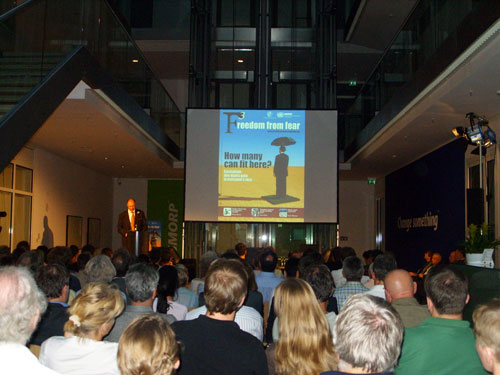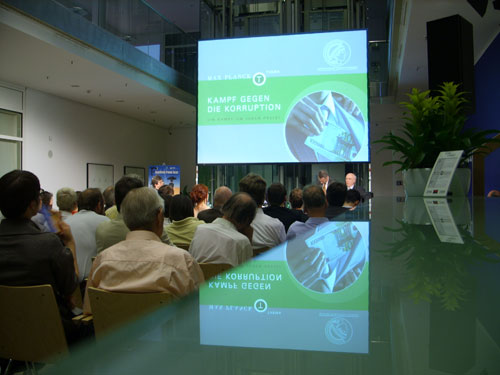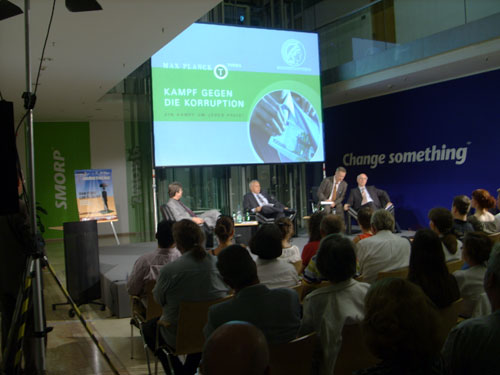

News
F3 Launch in Germany
The presentation was held during the conference on Corruption sponsored by the Max Planck Institute
Berlin, September 2009. Freedom From Fear Magazine (F3) was presented to the German public during the Max Planck Institute Forum, which was held in Berlin on Tuesday, 1 September 2009, in the central location of the Wissenschaftsforum.
The official launch of the magazine, co-published by UNICRI and the Max Planck Institute, was hosted within the framework of the annual symposium of the German-based institute. The appointment, one of the best-known cultural rendezvous of the German landscape, brought together some of the most influential intellectuals, politicians and representatives of the economic world.
“The potential and limits of corruption” was the title of the debate promoted to examine the latest implications of the international legislation against corruption. The debate discussed the recent case of the Deutsch Bahn, involving the misuse of employee data, illegal procurement of data via external service providers and the handling of emails, computer hard drives and network hard drives. The German case was the thematic teaser of the conference.
The Director of the Max Planck Institute for Foreign and International Criminal Law, Prof. Hans-Jorg Albrecht, and the Director of UNICRI, Mr. Sandro Calvani, embodied the discussion panel, addressing the question: “Fighting against corruption at all costs?” The experts, moderated by a representative of the European Anti-Fraud Office (OLAF), Mr. Wolfgang Hetzer, tried to analyse how and to what extent the right to investigate corruption charges can interfere with the individual’s right to privacy.
Prof. Jorg-Hans Albrecht explained the European case in the battle against corruption and the latest changes introduced by the new legislation in Germany. “European countries are now recognizing the eminent dangers of corruption,” said Albrecht, “and the urgent need to control corrupt practices in the political, administrative and economic system”.
UNICRI’s Director, Mr. Sandro Calvani, presented the magazine F3 and, in addition, he addressed the audience on the international repercussions of corruption. “Twenty-five percent of the GDP of African states is lost to corruption every year, amounting to $148 billion. But this is not all,” he continued, “we, the citizens, have to perceive corruption as a harmful behaviour that needs to be held back and culturally disrupted. It is a civil matter that involves us all.”



Berlin, September 2009. Freedom From Fear Magazine (F3) was presented to the German public during the Max Planck Institute Forum, which was held in Berlin on Tuesday, 1 September 2009, in the central location of the Wissenschaftsforum.
The official launch of the magazine, co-published by UNICRI and the Max Planck Institute, was hosted within the framework of the annual symposium of the German-based institute. The appointment, one of the best-known cultural rendezvous of the German landscape, brought together some of the most influential intellectuals, politicians and representatives of the economic world.
“The potential and limits of corruption” was the title of the debate promoted to examine the latest implications of the international legislation against corruption. The debate discussed the recent case of the Deutsch Bahn, involving the misuse of employee data, illegal procurement of data via external service providers and the handling of emails, computer hard drives and network hard drives. The German case was the thematic teaser of the conference.
The Director of the Max Planck Institute for Foreign and International Criminal Law, Prof. Hans-Jorg Albrecht, and the Director of UNICRI, Mr. Sandro Calvani, embodied the discussion panel, addressing the question: “Fighting against corruption at all costs?” The experts, moderated by a representative of the European Anti-Fraud Office (OLAF), Mr. Wolfgang Hetzer, tried to analyse how and to what extent the right to investigate corruption charges can interfere with the individual’s right to privacy.
Prof. Jorg-Hans Albrecht explained the European case in the battle against corruption and the latest changes introduced by the new legislation in Germany. “European countries are now recognizing the eminent dangers of corruption,” said Albrecht, “and the urgent need to control corrupt practices in the political, administrative and economic system”.
UNICRI’s Director, Mr. Sandro Calvani, presented the magazine F3 and, in addition, he addressed the audience on the international repercussions of corruption. “Twenty-five percent of the GDP of African states is lost to corruption every year, amounting to $148 billion. But this is not all,” he continued, “we, the citizens, have to perceive corruption as a harmful behaviour that needs to be held back and culturally disrupted. It is a civil matter that involves us all.”






